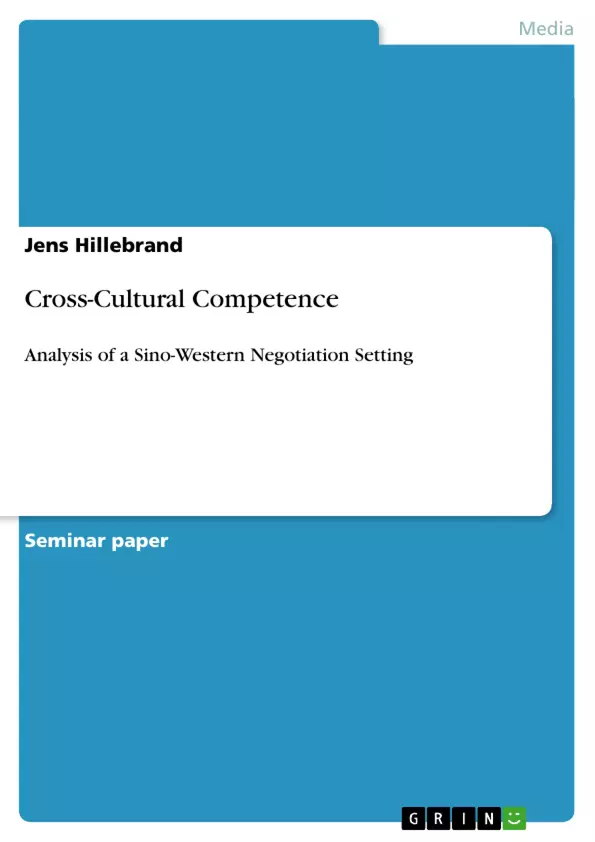This study analyses the challenges of cross-cultural negotiation settings by using a variety of cultural frameworks and theories. Basis for the analysis forms an incident between a Western company and the Chinese county which it operates in. The analysis reveals that major issues are grounded in different attitudes towards hierarchy, varying importance of group membership and loyalty as well as the cultures’ different perception of time. Further difficulties may result from distinct degrees of explicitness and differences in uncertainty avoidance. Concluding that awareness of cultural differences is crucial for successful negotiation outcomes the study will finally offer practical suggestions how to deal with the cultural challenges faced by each of the negotiating parties.
Inhaltsverzeichnis (Table of Contents)
- Executive Summary
- Introduction
- Analysis: Cultural Theory Applied
- Hofstede: Culture's Consequences
- Hall: High-Context vs. Low-Context Cultures
- Logic Paradigms within Cultures
- Conclusion
- Recommendation
- References
Zielsetzung und Themenschwerpunkte (Objectives and Key Themes)
This study aims to analyse the challenges of cross-cultural negotiation settings using a variety of cultural frameworks and theories. The analysis focuses on an incident between a Western company and the Chinese county in which it operates.
- Different attitudes towards hierarchy
- Varying importance of group membership and loyalty
- Cultural perceptions of time
- Degrees of explicitness in communication
- Differences in uncertainty avoidance
Zusammenfassung der Kapitel (Chapter Summaries)
The executive summary provides an overview of the study's purpose, methodology, and findings. The introduction sets the stage by discussing the challenges of cross-cultural management and introducing the case study of ColourBest Holding (Hong Kong) Ltd. in Southern China.
The analysis section delves into cultural theory, beginning with Hofstede's cultural framework. This section explores the concepts of power distance, individualism vs. collectivism, and their implications for cross-cultural negotiations.
Schlüsselwörter (Keywords)
The key keywords and focus topics of this study include cross-cultural negotiation, cultural frameworks, Hofstede's cultural dimensions, power distance, individualism vs. collectivism, high-context vs. low-context cultures, logic paradigms, and the challenges of intercultural communication.
Frequently Asked Questions
What is cross-cultural competence in business?
Cross-cultural competence is the ability to understand and navigate cultural differences in professional settings, such as negotiations between Western companies and partners in regions like China.
What are Hofstede's Cultural Dimensions?
Hofstede's framework includes dimensions like power distance, individualism vs. collectivism, and uncertainty avoidance, which help explain behavioral differences across cultures.
How do high-context and low-context cultures differ?
High-context cultures (like China) rely heavily on implicit communication and non-verbal cues, while low-context cultures (like many Western countries) prefer explicit and direct communication.
Why is hierarchy important in cross-cultural negotiations?
Different attitudes towards hierarchy, or "power distance," can lead to misunderstandings regarding authority, decision-making processes, and respectful communication.
What role does the perception of time play in business?
Cultures perceive time differently; some focus on long-term relationships and flexibility, while others prioritize punctuality and strict schedules, which can cause friction in negotiations.
- Citar trabajo
- Jens Hillebrand (Autor), 2007, Cross-Cultural Competence, Múnich, GRIN Verlag, https://www.grin.com/document/87788



